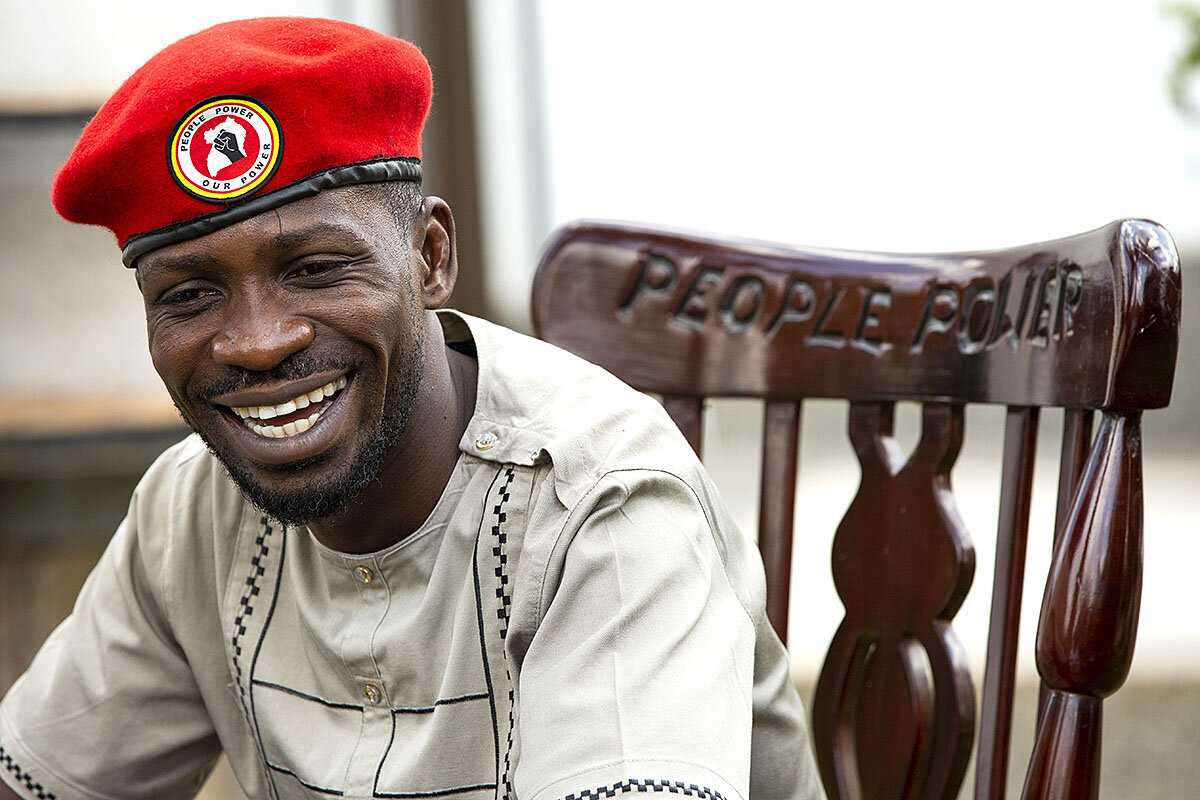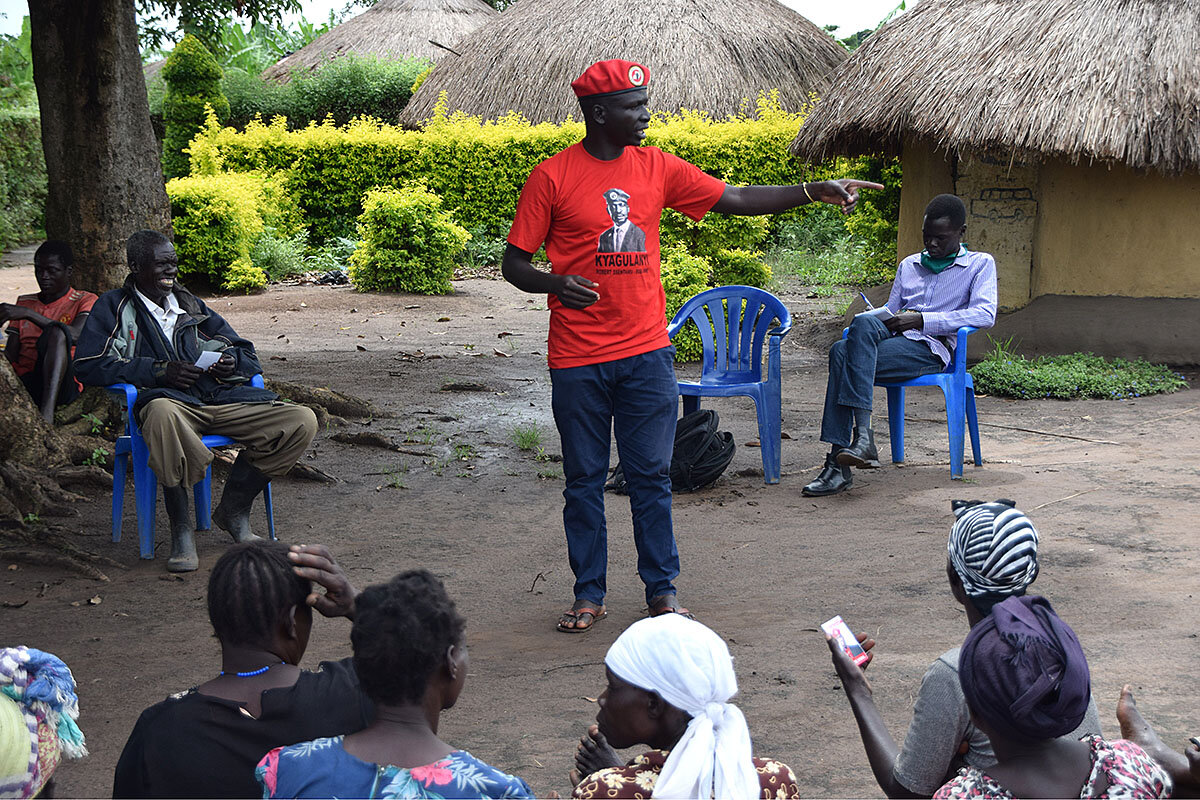'People Power' in Uganda: The lawyer promoting a pop-star candidate
Loading...
| Gulu, Uganda
Lina Zedriga thought she was done with politics. As a lawyer and activist, she had fought for women’s voices to be heard everywhere in Uganda, from land disputes to peace negotiations to parliament. And now she wanted to go home to the north. Become a catechist. Keep goats. Rest.
One day in February she changed her mind.
Bobi Wine was in court in Kampala, the Ugandan capital, accused of organizing an illegal protest. The singer-turned-politician, whose real name is Robert Kyagulanyi, is the leading opposition candidate for president in elections early next year.
Why We Wrote This
Opposition parties in Africa are often strongest in cities. With elections looming in Uganda, can the followers of Bobi Wine, a Ugandan singer-turned-politician, build support beyond the capital?
Ms. Zedriga, who was there to watch another case, saw Mr. Wine leave the courthouse into a throng of raucous fans. Suddenly the police fired tear gas. Elsewhere that day one of Mr. Wine’s supporters was killed in a road accident – knocked dead by a police car, said Mr. Wine, which the police deny. “We went for the burial,” recalls Ms. Zedriga, “and one of the messages this young girl left was let me not die in vain.”
Since 1986 Uganda has been led by Yoweri Museveni, a former rebel. He has won five elections, on a steeply tilted playing field, and retains some genuine support. Most Ugandans expect him to triumph again in 2021. But Mr. Wine’s candidacy is sparking excitement. At 38, he is half Mr. Museveni’s age. His People Power movement has drawn in student radicals, seasoned politicians, and the young strivers of the city, who scrape a living selling vegetables or riding motorbike taxis.
The movement is messy, vibrant, and unpredictable, galvanizing people with the loose promise of change. In its unofficial anthem, a reworking of a Pentecostal hymn, Mr. Wine paints a vision of a “new Uganda” free of corruption, tear gas, and land grabs, where everyone will “walk with swag.”
But Mr. Wine faces fierce pushback. In 2018 he was arrested, beaten, and charged with treason, along with 35 of his supporters. Last week the army and police raided his headquarters, and on Wednesday a judge will rule in a case challenging his leadership of his party, the National Unity Platform (NUP). His critics sneer that he is inexperienced and lacks ideas.
If Mr. Wine is to threaten Mr. Museveni, he has to win support in the countryside, where three-quarters of Ugandans live. And in March he asked Ms. Zedriga to help him do it. She is now his deputy and the northern coordinator of the NUP, a role she sees as an extension of her gender activism. “Empowered women transform societies,” reads a sign above her desk.
“Let us see how our political participation translates into salt for the women, into the five hundred shillings which we usually tie around our kitenges [fabric wraps],” she says, a rosary around her neck. She has returned to the north after all: not to keep goats, but to build a movement.
Reclaiming humanity
Uganda did not exist until British colonialists created it. Like shoddy welders, they fused together a disparate group of kingdoms and societies. Sometimes, the nation has pulled apart at the seams.
After independence northerners dominated Uganda’s army and, by extension, its politics. The ascent of Mr. Museveni, a southwesterner, ushered in peace in the south but violence and social breakdown in the north – most notoriously the rebellion of Joseph Kony, a self-proclaimed spirit medium, and his Lord’s Resistance Army. The government herded nearly 2 million people into displacement camps, and it was not until 2006 that peace started to return.
“In the north we have never been beggars,” says Ms. Zedriga, who as a lawyer collected statements from women raped in the war. “Now we have generations that are beggars. So our agenda for northern Uganda is let us wake up, reclaim our identity, reclaim our humanity.”
Samuel Obedgiu agrees. When he was 11, he was abducted by Mr. Kony’s rebels, spending nine months in the bush. At university in Kampala he became a protest leader, earning the nickname “Strike Machine.” He now leads NUP’s youth wing in the north, working with Ms. Zedriga from NUP’s new office in Gulu town. He says he is using a “termite strategy” to reach voters, going “underground” like the wood-eating insects.
One morning in September he rides a hired motorbike to a homestead in Nwoya district. Villagers trudge in from the fields and gather beneath a mango tree, still dripping from the morning rain.
“Where should we go as Acholi?” Mr. Obedgiu asks, referring to the Acholi people who live in the area. “What should be the future for our children?”
They work hard to pay school fees, he reminds his audience, but in Kampala their children only find jobs as watchmen and maids.
The crowd murmurs agreement. But they have heard this message from opposition politicians before. They have done their best to vote for change, says one woman, but the rest of the country lets them down. A young man in a faded soccer shirt suggests they should focus on local leaders, because there is no hope of changing the president.
Another man, though, gestures at Mr. Obedgiu’s T-shirt, emblazoned with Mr. Wine’s face. “That one. We want to try him.”
Uphill battle
Mr. Museveni’s government leaves space for the opposition – just not enough for them to win. The press, though constrained, is lively. Elections, though flawed, are fiercely fought.
But politics is a murky business, as Ms. Zedriga knows. Her husband disappeared after the 2001 election, when he was a campaign manager for Kizza Besigye, the main opposition candidate. The government said he had fled to join a rebel group. She still holds out hope that he is alive somewhere.
And politics is dirty too. Ms. Zedriga claims that she was recently at a cafe in Kampala when she was approached by a soldier and a lawyer, promising her a government job, two cars, and 5 billion shillings ($1.3 million).
“I held my bowl of soup,” she says, breaking into characteristic laughter. “I almost poured it on them!”
The screw is tightening. Security officials stopped NUP from opening an office in Kitgum, another northern town. Mr. Obedgiu and Brian Mungu, a parliamentary candidate, say they have been arrested while campaigning. Mass rallies have been banned to stop the spread of COVID-19, a rule that the opposition says is selectively enforced.
Jimmy Patrick Okema, a police spokesman in Gulu, insists that the rules apply equally to all. “As long as you do something that is contrary to the guidelines we shall not entertain that,” he adds.
The candidates milling around NUP’s Gulu office are passionate but inexperienced – and struggling for funds. Lalam Irene is a radio host and singer who says she wants to empower women and heal Uganda’s “wounded politics.” Charles Ochora is a businessman who only joined NUP after losing in the ruling-party primaries in September. Caesar Lubangakene, a snappily dressed humanitarian worker, is running for office in Gulu East; among his rivals is the local priest, running as an independent.
“NUP will not do well in northern Uganda,” says Peter Labeja, who hosts a political talk show on Radio Rupiny, a government-owned station. Local support for the ruling National Resistance Movement has increased since the end of the war, he notes. “[There is] a general appreciation that Museveni is going nowhere for now.”
But Ms. Zedriga no longer thinks of retirement. “This is the moment when everybody’s feeling enough is enough – enough of the impunity, enough of the injustices, enough of the exclusion,” she says. “I am very optimistic.”
Arthur Owor contributed reporting from Gulu.









